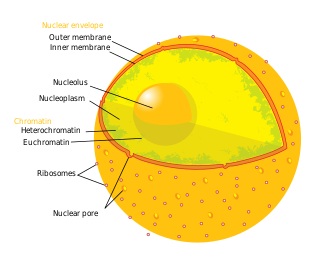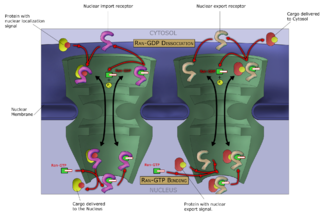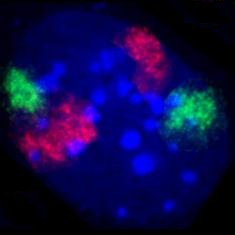Cell nucleus
Cell Nucleus[edit]
The cell nucleus is a membrane-bound organelle found in eukaryotic cells. It contains most of the cell's genetic material, organized as multiple long linear DNA molecules in complex with a large variety of proteins, such as histones, to form chromosomes. The nucleus maintains the integrity of these genes and controls the activities of the cell by regulating gene expression.
Structure[edit]

The nucleus is composed of several key structures:
Nuclear Envelope[edit]
The nuclear envelope is a double membrane that encloses the entire organelle and separates its contents from the cellular cytoplasm. The outer membrane is continuous with the endoplasmic reticulum.
Nuclear Pores[edit]

Nuclear pores are large protein complexes that cross the nuclear envelope, allowing the transport of molecules across the nuclear envelope. This transport includes the movement of RNA and ribosomal subunits from the nucleus to the cytoplasm and the import of proteins, carbohydrates, signaling molecules, and lipids into the nucleus.
Chromatin[edit]
Chromatin is the complex of DNA and protein found in the nucleus, which packages the DNA into a more compact, denser shape. It is divided into euchromatin and heterochromatin, which differ in their degree of condensation and transcriptional activity.
Nucleolus[edit]
The nucleolus is a region within the nucleus that is involved in the production of ribosomes. It is the site of rRNA synthesis and ribosome subunit assembly.
Nuclear Matrix[edit]
The nuclear matrix is a network of fibers found throughout the inside of a cell nucleus and is thought to provide structural support and may be involved in the regulation of gene expression.
Cajal Bodies[edit]

Cajal bodies are spherical sub-organelles found in the nucleus of proliferative cells. They are involved in the biogenesis of snRNPs and other RNA-related processes.
Function[edit]
The primary functions of the nucleus include:
- Gene Expression Regulation: The nucleus controls the expression of genes by regulating the transcription of DNA into RNA.
- DNA Replication: The nucleus is the site of DNA replication, where the cell's genetic material is duplicated before cell division.
- RNA Processing: The nucleus is involved in the processing of pre-mRNA into mature mRNA, which is then exported to the cytoplasm for translation.
Transport Mechanisms[edit]

Transport across the nuclear envelope is mediated by the nuclear pore complexes and involves a variety of transport receptors. The Ran-GTP cycle is a key regulator of nucleocytoplasmic transport.
Chromosome Territories[edit]

Chromosome territories are regions of the nucleus preferentially occupied by particular chromosomes. This spatial organization is thought to play a role in the regulation of gene expression.
Transcription Factories[edit]
Transcription factories are discrete sites within the nucleus where active transcription occurs. These factories contain clusters of RNA polymerases and associated transcription factors.
Related Pages[edit]
Ad. Transform your life with W8MD's Budget GLP-1 injections from $49.99


W8MD offers a medical weight loss program to lose weight in Philadelphia. Our physician-supervised medical weight loss provides:
- Weight loss injections in NYC (generic and brand names):
- Zepbound / Mounjaro, Wegovy / Ozempic, Saxenda
- Most insurances accepted or discounted self-pay rates. We will obtain insurance prior authorizations if needed.
- Generic GLP1 weight loss injections from $49.99 for the starting dose of Semaglutide and $65.00 for Tirzepatide.
- Also offer prescription weight loss medications including Phentermine, Qsymia, Diethylpropion, Contrave etc.
NYC weight loss doctor appointmentsNYC weight loss doctor appointments
Start your NYC weight loss journey today at our NYC medical weight loss and Philadelphia medical weight loss clinics.
- Call 718-946-5500 to lose weight in NYC or for medical weight loss in Philadelphia 215-676-2334.
- Tags:NYC medical weight loss, Philadelphia lose weight Zepbound NYC, Budget GLP1 weight loss injections, Wegovy Philadelphia, Wegovy NYC, Philadelphia medical weight loss, Brookly weight loss and Wegovy NYC
|
WikiMD's Wellness Encyclopedia |
| Let Food Be Thy Medicine Medicine Thy Food - Hippocrates |
Medical Disclaimer: WikiMD is not a substitute for professional medical advice. The information on WikiMD is provided as an information resource only, may be incorrect, outdated or misleading, and is not to be used or relied on for any diagnostic or treatment purposes. Please consult your health care provider before making any healthcare decisions or for guidance about a specific medical condition. WikiMD expressly disclaims responsibility, and shall have no liability, for any damages, loss, injury, or liability whatsoever suffered as a result of your reliance on the information contained in this site. By visiting this site you agree to the foregoing terms and conditions, which may from time to time be changed or supplemented by WikiMD. If you do not agree to the foregoing terms and conditions, you should not enter or use this site. See full disclaimer.
Credits:Most images are courtesy of Wikimedia commons, and templates, categories Wikipedia, licensed under CC BY SA or similar.
Translate this page: - East Asian
中文,
日本,
한국어,
South Asian
हिन्दी,
தமிழ்,
తెలుగు,
Urdu,
ಕನ್ನಡ,
Southeast Asian
Indonesian,
Vietnamese,
Thai,
မြန်မာဘာသာ,
বাংলা
European
español,
Deutsch,
français,
Greek,
português do Brasil,
polski,
română,
русский,
Nederlands,
norsk,
svenska,
suomi,
Italian
Middle Eastern & African
عربى,
Turkish,
Persian,
Hebrew,
Afrikaans,
isiZulu,
Kiswahili,
Other
Bulgarian,
Hungarian,
Czech,
Swedish,
മലയാളം,
मराठी,
ਪੰਜਾਬੀ,
ગુજરાતી,
Portuguese,
Ukrainian